The cinematic world doesn’t seem to deserve Melissa McCarthy. Neither does TV for that matter. Looking at her career, you’d be forgiven if you don’t imagine her immediately picture her in a more dramatic role. Even if it’s been hinted at more than a few times. Like Adam Sandler before her, there’s an untapped strength behind the giggles, the guffaws and pratfalls. Yet too often it seems as if they pushed to the wayside, when it comes to self-financed projects. Some of those elements are still on display in Marielle Heller’s Can You Ever Forgive Me?, but surrounding it is a stellar portrait of a lonely abrasive soul, who takes to a minor life of crime. It may seem like a simple piece, but that’s just because of how unassumingly it weaves its magic. Helping matters further is that the story itself is based on real events.
Lee Israel (McCarthy) was once a semi-famous autobiographer. She worked with illustrious and private actors, crafting memoirs that landed on the New York Times best-seller’s list. By 1991 though, at the age of 51, all that is in the past. A crass and off putting demeanor costs her the day job that helped her just eek by. That attitude, paired with a steady dose of drinking alienates her from fellow writers. It causes her agent (Jane Curtin) to avoid her calls, until either she takes stock in her shortcomings, or utterly changes the fabric of her writing. No one, the agent says, is dying for another Fanny Brice memoir. There’s little wonder why she prefers the company of her trusty cat, over any other living soul. Desperate for cash to offset pilling bills, she opts to sell a letter written to her from Katherine Hepburn.

As a criminal idea forms in her brain, she runs into Jack Hock (a glorious Richard E. Grant). Someone she faintly remembers meeting at a party long ago, the two instantly mesh. Societal outsiders (Lee a lesbian, Jack a gay man), they sense a kinship in one another. Regardless how ill-advised the pairing may seem. The closer they get, the further down the rabbit hole Lee falls. In a desperate attempt to create a steady stream of income, she begins forging “long-lost” letters by famously deceased authors. At first, she tells herself it’s out of necessity, but quickly it becomes just the latest addiction to reign control of her life. Jack’s situation isn’t much better. Something of a transient, he’s also an addict like Lee, albeit with a somewhat sunnier disposition. As thick as thieves, they don’t fully realize the danger they’re waltzing into, concerning the world of literary antiquities.
Just as soon as you think you’ve got the film pegged, it pivots, in anticipation. Just as things feels as if they may be over staying their welcome at certain points, it wraps up that thread quickly. At times almost jarringly. Those who aren’t aware of the real life story are the most likely to be surprised, as a detour into a mini-crime caper starts to unfold. Marielle Heller handle the shift with care. Little details help the transition feel organic, while also maintaining the ridiculousness nature of Israel’s decision. There’s also a surprising hint of uncomfortable tension that creeps in, though it’s a tad short-lived. It doesn’t matter, because its still effective. That’s the sign of a good director. Constantly expanding their reach, even if it’s just dipping their toes into someone else’s pool.

The heart of Can You Ever Forgive Me? Isn’t really the story of how Lee came to be where she is, that much is evident from the get to. It’s her friendship with Jack that is the backbone of the narrative. How two damaged souls managed to feel a little less alone in the world, when they were together. That doesn’t mean they bettered each other, or their flaws melted away. Merely that companionship or comradeship can make the world seem a little less cruel, even if the two people fighting back against the tide are cruel themselves. Of course, given their reluctance to change, there’s a cloud of doom that hangs over their heads.
The film has a tenuous tightrope to walk with Lee. Make her sympathetic enough to engage the audience and also reminding them why many would be put off by her. McCarthy and Heller accomplish this with great aplomb, creating a figure of infinite sadness, who can’t help but be her own worse enemy. In a strange way, while set in a bygone era, it brings to mind a topic that’s big today: impostor syndrome. While never stated, it’s interesting to draw the correlation pertaining to a writer who’s constantly struggling because of their perceived limitations. One that manifests also in socially awkward and anxiety ridden outbursts. It isn’t that surprising that Lee begins to feel at home in writing under the guise of those who had already achieved success. All while worrying she’ll be exposed as a fraud. A reach? Possibly, but a point nonetheless ripe for discussion.

At times the proceedings come off as small or minor. Yet that intimate nature makes for an engaging focus. It doesn’t hurt that McCarthy does stellar work in the part. Relying on natural comic timing and a physicality that plays up her anxieties, rather than flying off the rails. Grant goes toe to toe with her, refining a persona he used to great effect years ago. Together they make Can You Ever Forgive Me?
a stunningly minor triumph. The kind that are too far and few these days.



